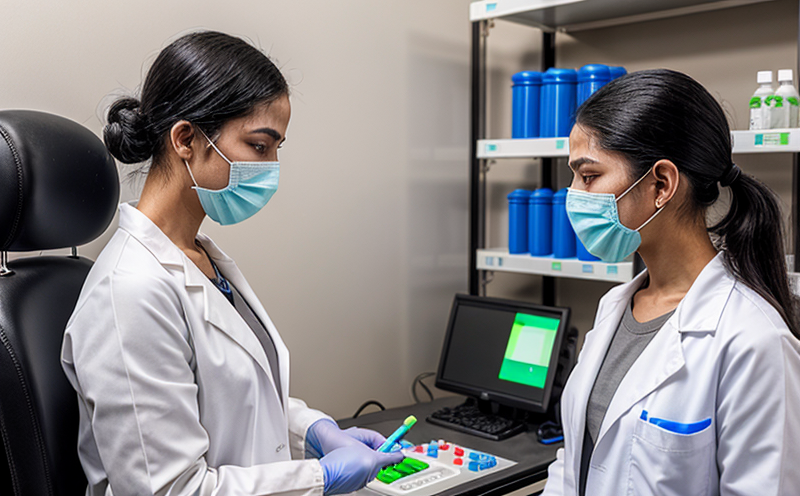In Vitro Mitochondrial DNA Mutation Testing
The in vitro mitochondrial DNA mutation testing service is a critical tool within pharmaceutical development and quality assurance. This service evaluates the potential for drugs, formulations, or other compounds to induce mutations in mitochondrial DNA (mtDNA). Mitochondria are essential organelles responsible for producing adenosine triphosphate (ATP), which powers cellular activities. Mutations in mtDNA can lead to severe health issues such as neurodegenerative diseases and metabolic disorders.
The testing process involves exposing cells containing mtDNA to the substance under investigation, followed by comprehensive analysis of any resulting mutations. This service helps pharmaceutical companies identify potential genotoxic risks early in drug development, ensuring compliance with regulatory standards like ISO 10993-25 and ICH Q7A.
Our lab uses advanced techniques such as next-generation sequencing (NGS) to detect mutations accurately. The testing protocol is stringent, involving multiple steps including cell culturing, exposure conditions, timeframes, and post-exposure analysis. We follow a rigorous quality management system compliant with ISO 9001:2015 to ensure reliable results.
The importance of this test cannot be overstated in the pharmaceutical industry. It helps protect public health by identifying compounds that could cause adverse effects due to mtDNA mutations. By incorporating this testing into their pipeline, companies can enhance product safety and regulatory compliance.
| Key Parameters | Description |
|---|---|
| Cell Type | HeLa cells or other relevant cell lines known to contain mtDNA |
| Exposure Duration | 24 hours, 48 hours, and up to 7 days depending on the compound |
| Sample Preparation | Cells are treated with test compounds for defined periods. |
| Analytical Methodology | NGS analysis of mtDNA sequences post-exposure. |
The results provide detailed insights into the mutagenic potential of a substance, allowing developers to make informed decisions about further clinical trials or product release. This service is particularly useful for compounds with known genotoxic risks and those undergoing extensive reformulation processes.
Our team has extensive experience in conducting such tests, leveraging state-of-the-art facilities and expertise to deliver accurate and reliable results. We work closely with clients throughout the testing process, offering guidance on sample preparation, interpretation of results, and regulatory compliance strategies.
Benefits
- Early Identification: Detects potential genotoxic risks early in development.
- Compliance: Ensures adherence to international standards like ISO 10993-25 and ICH Q7A.
- Risk Mitigation: Reduces the likelihood of post-market safety issues.
- Enhanced Safety: Guarantees that products are safe for human use.
- Cost Efficiency: Identifies problematic compounds early, saving time and resources.
The in vitro mitochondrial DNA mutation testing service not only aids in regulatory compliance but also enhances the overall safety profile of pharmaceutical products. By identifying potential risks at an early stage, companies can prevent costly recalls and improve public trust in their offerings.
Industry Applications
| Application | Description |
|---|---|
| New Drug Development | Evaluating the genotoxic potential of new drug candidates. |
| Formulation Changes | Detecting mutations in compounds after formulation changes or additions. |
| Ingredient Screening | Identifying potentially harmful ingredients early in development. |
| Quality Assurance | Ensuring that final formulations meet safety and efficacy standards. |
This service is essential for ensuring the safety of pharmaceutical products across various stages of development. By incorporating this testing into their pipeline, companies can enhance product safety and regulatory compliance, thereby protecting public health.
- New Drug Development: Identifies potential genotoxic risks early in the process.
- Formulation Changes: Ensures that changes do not introduce new mutagenic compounds.
- Ingredient Screening: Provides a robust method for evaluating ingredient safety.
- Quality Assurance: Verifies that final products meet stringent safety and efficacy standards.
The comprehensive nature of this service makes it applicable across multiple aspects of pharmaceutical development, ensuring that companies can make informed decisions about their products' safety.
International Acceptance and Recognition
- ISO 10993-25: International standard for the biocompatibility evaluation of medical devices.
- ICH Q7A: Guidelines on good manufacturing practices for pharmaceutical products.
- US FDA: Recognizes in vitro testing methods as valid alternatives to animal studies.
- European Medicines Agency (EMA): Endorses the use of in vitro tests for genotoxicity assessment.
The in vitro mitochondrial DNA mutation test is widely accepted and recognized by regulatory bodies around the world. This recognition underscores its importance in ensuring product safety and compliance with global standards.
| Bodies Recognizing the Test | Description |
|---|---|
| ISO 10993-25 | Standardizes biocompatibility evaluation of medical devices, including genotoxicity assessment. |
| ICH Q7A | Provides guidelines on good manufacturing practices for pharmaceutical products, emphasizing safety and efficacy. |
| US FDA | Affirms the validity of in vitro testing methods as alternatives to animal studies. |
| European Medicines Agency (EMA) | Supports genotoxicity assessment through the use of in vitro tests, promoting ethical and efficient regulatory practices. |
The widespread acceptance of this testing method by major regulatory bodies ensures that pharmaceutical companies can confidently rely on our service for meeting global standards. This recognition also facilitates smoother interactions with international markets, enhancing market entry strategies and overall business operations.





